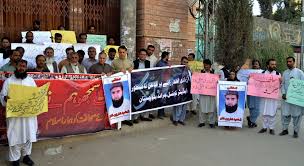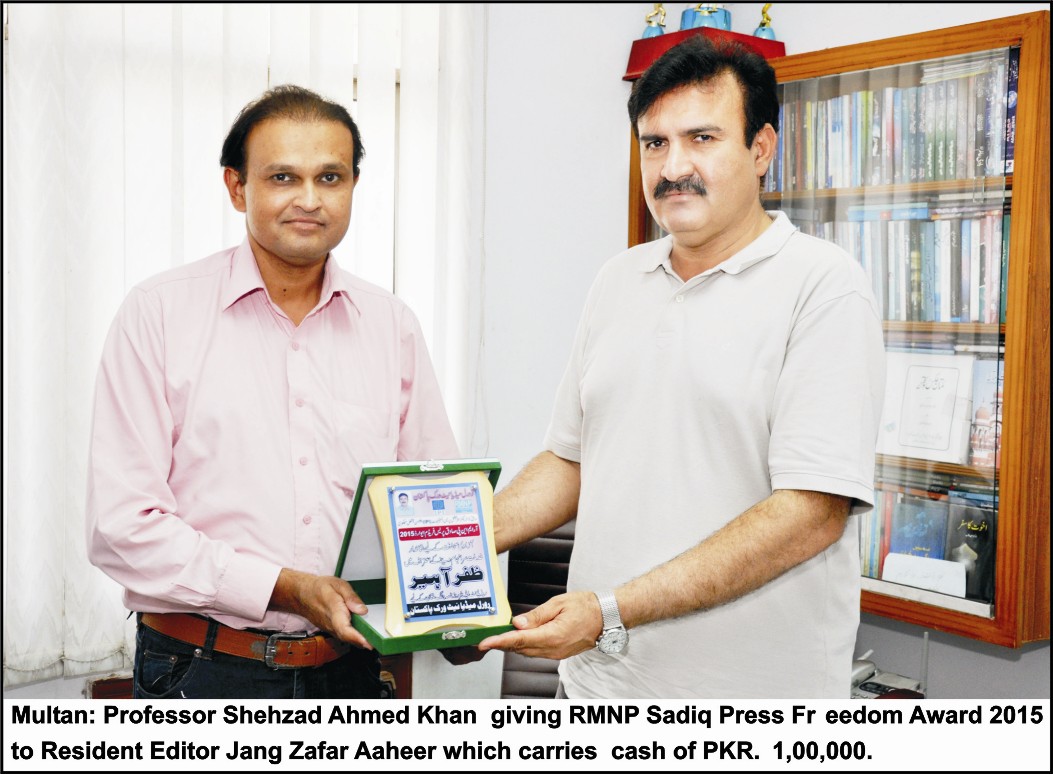RMNP expresses concern over rising incidents of violence against journalists
On the occasion of International Day to End Impunity for Crimes against Journalists on 2 November, the Rural Media Network Pakistan (RMNP) expressed its deep concern that media workers face increasing risks in different urban and rural areas of Pakistan and demanded Pakistani government to make concrete efforts to address increasing levels of impunity that continue to blight journalism and the safety of media workers across the country.
Marking the UN International Day to End Impunity for Crimes Against Journalists, the RMNP said that one hundred twenty eight journalists and media workers have been killed in Pakistan since 2006 out of which six were killed in 2016. In 2015 four journalists while in 2014, fourteen journalists were murdered in the line of duty which reflects that impunity against Pakistani media continues to rise. This was revealed by the Rural Media Network Pakistan (RMNP) in its report issued on the eve of International Day to End Impunity Crimes against Journalists. Report says that seven Pakistani journalists and media workers have been killed up to 31st October, this year according to RMNP monitoring. Pakistan ranks 139 out of 180 countries on the World Press Freedom Index 2017 compiled by Reporters without Borders, placing it among the world’s most dangerous countries for journalists.

The biggest challenge apart from direct threat to the life of journalists in Pakistan is a culture of impunity. “The killers of only six journalists out of the 128 journalists killed in Pakistan have been arrested. This promoted impunity and allowed anyone to threaten and target journalists because they know they can get away with murder. Journalists often complain about receiving threats, including from both state and non-state actors which can lead to violent attacks against them.
RMNP also expressed its concern that , the State failed to provide statistics on the investigations, prosecutions and convictions of these crimes as requested on numerous occasions by UNESCO,UN Human Rights Committee and others , confirming doubts about government commitment to fight impunity.
RMNP expressed its dis-satisfaction over the Ministry of Information & Broadcasting ’s performance and alleged that the ministry was sitting on The Protection of Journalists Bill, 2014.RMNP recalled that the government had presented a bill on the same subject and the matter was being prolonged as another bill on the matter, moved by MP Sahibzada Tariqullah, was on the table. RMNP demanded of Pakistan government that the bill for security, safety and protection of journalists should be presented before the federal cabinet for approval. It urged that the safety of journalists should be ensured at any cost and legislation be introduced under UN Resolution 1736 .The report of the committee headed by Federal Minister Chaudhry Ahsan Iqbal set up for the protection of journalists should be included in the proposed bill .
RMNP in its report confirmed, the Pakistan Electronic Media Regulatory Authority (PEMRA) has been used to silence the broadcast media by either suspending licenses or simply threatening to do so. In addition, media houses are also exposed to propaganda from state agencies, pressured by powerful political elements and non-state actors involved in the current conflict to publish what they are spoon-fed.RMNP observed that that other important constraints on media freedom which impinge on journalists’ ability to do their work, are the cultural of secrecy and the levels of bureaucracy concerning access to official information.“Journalists find it almost impossible to find information related to large government deals or projects, and ministries remain tight-lipped on their activities and finances, denying access to information for journalists.”
RMNP noted increasing incidents of violence in urban centres recently and quoted The News reporter Ahmed Noorani who was intercepted and attacked by unidentified assailants in Islamabad’s Zero Point area on 27th October Friday morning. The attackers assaulted Noorani and his driver with knives near Urdu University. Both the injured were taken to Poly Clinic for treatment. In September, anchorperson Matiullah Jan was travelling to Bhara Kahu from Islamabad along with his family when two motorbike riders threw a piece of brick on his car and broke its windscreen. However, the journalist and his family members remained unhurt.
Two different attacks targeting newspaper agencies were reported in Balochistan on 26th October ─ one a hand grenade attack on a newspaper agency office in Turbat which injured eight people, and the other an incident of firing at a vehicle carrying newspapers in Awaran.
The attacks come as separatist militant groups have launched a campaign against media houses for not publishing their statements in newspapers.
All Pakistan Newspapers Society (APNS) and The Council of Pakistan Newspaper Editors has declared the situation regarding press freedom in Balochistan as extremely bad and contrary to democratic standards.
Rural Journalists Issues
RMNP report which is compiled in country Urdu language reminded that majority of the journalists, killed in the line of duty belong to small towns and rural areas. Pakistan’s 65 percent population lives in rural areas and small towns but media are urban oriented. There is no comprehensive system to act when a journalist is attacked, kidnapped or to tortured. No one is aware of any hot line, if exists. Rural journalists have no contacts with the journalist bodies active in big cities.
a) Local press clubs are not playing their role as expected; therefore rural journalists work in miserable conditions. A centralized system to monitor press freedom violations in Pakistan in not available.
b) Rural journalists are back bone of the media industry. They are usually unpaid, in many feudal dominated areas; rural journalists are working as puppets of feudal lords. Due to mushroom growth of journalists in rural areas and small towns, it is necessary to prepare them to address their safety issues. It is urgent need to improve their working conditions.
c) All Pakistan Newspapers Society (APNS), Council of Pakistan Newspaper Editors (CPNE) and Pakistan Broadcasters Association (BPA) should come forward and pay attention to their rural correspondents’ long standing problems.
d) Since 2002, national dailies and TV channels have appointed their correspondents not only in small towns but also at union council level. In our view current strength of Pakistan’s journalists is higher than PFUJ’s figures of 22000.More training sessions are required in those far-flung areas where journalists are untrained and working in hostile environment.
e) Lack of attention towards professional ethics has posed risks for rural journalists. Media houses are not paying attention to train their respective correspondents and field reporters. Training of field reporters would definitely minimize the security risks.
f) Dangerous race of “Breaking News” without confirming the facts has claimed the lives of many rural reporters in Pakistan. Owners of the media houses did not realize that anchors are putting field reporters at risk.
g) Rural journalists are generally less educated and their access to computer is still limited. It is due to meager resources and lack of training. Internet training is essential to follow the safety guide lines and monitoring the press freedom violations.
h) There is glaring absence of female journalists in rural Pakistan which means that women perspective is missing in our national media. UNESCO and international organisations should pay attention and play its role to address this issue.
i) Self-censorship is imposed on daily basis as journalists are facing threats from fundamentalists, extremists and in some areas from feudal lords. In FATA, no newspaper is allowed by law and PEMRA has no jurisdiction there.
Recommendations by Rural Media Network Pakistan to end impunity for crimes against media
Rural Media Network Pakistan (RMNP), is only non-governmental organization which is based in rural Pakistan committed to promoting and defending freedom of expression recommends the following measures be adopted to control the alarming level of violence against media, and to end impunity for those who attack media practitioners and institutions.
1-A special prosecutor on violence against media should be appointed at federal and all four provincial headquarters to investigate cases of violence against media.
2- Criminal cases should be registered without any delay but should also be properly investigated and prosecuted against the perpetrators of violence against media.
3- Media houses should take the responsibility in ensuring safety of media personnel. All Pakistan Newspapers Society (APNS), Pakistan Broadcasters Association (PBA), Council of Newspapers Editors(CPNE) along with three factions of Pakistan Federal Union of Journalists (PFUJ) should ensure long-term follow up of cases of assault on media organizations and workers
4- Journalists should be provided with safety and first aid trainings and guidance on how to report in hostile environment. Journalists working in conflict areas should also be provided with guidance in recognizing and dealing with stress and post traumatic stress.
5-All media houses should provide safety equipment to their reporters i.e. bullet proof jackets, helmets and GPS Cell phones irrespective of the size of city.
6-All media houses should provide insurance cover to their reporters, cameramen and supporting staff who cover dangerous assignments.
7- Media house should pay at least one million rupees to the widow of a rural area journalist who is sending them news under any kind of arrangement written or verbal what so ever, if he is killed during the coverage of dangerous assignment and 0.5 million rupees if he gets serious injuries.
8-Media house should pay all the expenses incurred on his medical treatment until and unless he is fit to resume his routine activities.
9-All media houses should take immediate steps with consultation of concerned authorities for the safety of newsmen working in sensitive areas like Southern Punjab.
10- All media houses should take follow up actions if a journalist is kidnapped in line of his duty and make sure that he is released safely, without any harm.
.
11-Pakistan government should provide announced compensation of the previous government to the heirs of those slain journalists who had been killed in the line of duty.
12- Pakistan Bar Council and all four provincial bar councils should be taken on board to get the speedy information about the judicial follow up of the cases.


